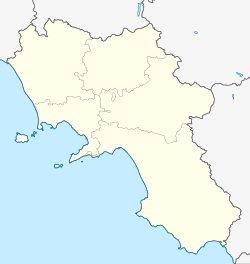
Back ኩሜ (ጣልያን) Amharic كوماي Arabic كوماى ARZ Кумы Byelorussian Куме Bulgarian Cumes Catalan Cumae German Κύμη (Μεγάλη Ελλάδα) Greek Kumo Esperanto Cumas Spanish
Κύμη / Κύμαι / Κύμα Cuma | |
 The terrace of the Temple of Apollo | |
| Location | Cuma, Metropolitan City of Naples, Campania, Italy |
|---|---|
| Region | Magna Graecia |
| Coordinates | 40°50′55″N 14°3′13″E / 40.84861°N 14.05361°E |
| Type | Settlement |
| History | |
| Builder | Colonists from Euboea |
| Founded | 8th century BCE |
| Abandoned | 1207 AD |
| Periods | Archaic Greek to High Medieval |
| Associated with | Cumaean Sibyl, Gaius Blossius |
| Events | Battle of Cumae |
| Site notes | |
| Management | Direzione Regionale per i Beni Culturali e Paesaggistici della Campania |
| Website | Sito Archeologico di Cuma (in Italian) |
Cumae (Ancient Greek: Κύμη, romanized: (Kumē) or Κύμαι (Kumai) or Κύμα (Kuma);[1] Italian: Cuma) was the first ancient Greek colony of Magna Graecia on the mainland of Italy and was founded by settlers from Euboea in the 8th century BCE. It became a rich Roman city, the remains of which lie near the modern village of Cuma, a frazione of the comune Bacoli and Pozzuoli in the Metropolitan City of Naples, Campania, Italy. The archaeological museum of the Campi Flegrei in the Aragonese castle contains many finds from Cumae.
- ^ "William J. Slater, Lexicon to Pindar, Κύ̂μα". www.perseus.tufts.edu.

